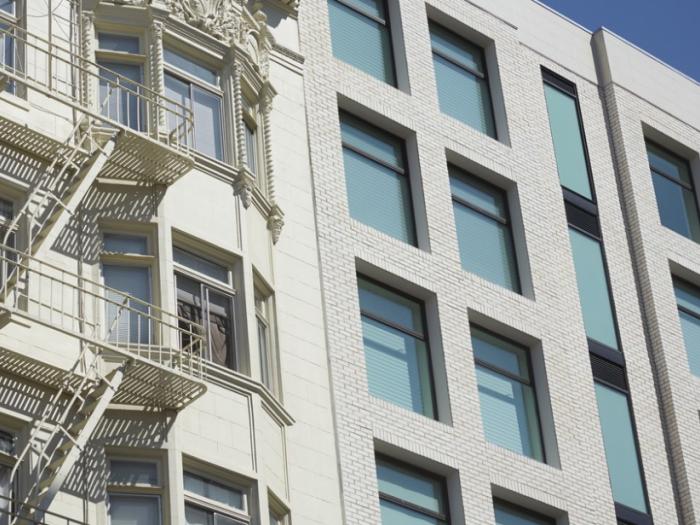
Retained Elements Design Guidelines
Project status: completed
San Francisco Planning, in consultation with the Planning and Historic Preservation Commissions and City stakeholders, is developing this set of guidelines to direct project applicants and design teams to study and explore ways to combine elements of existing structures and new development.
These Guidelines were adopted by the Planning Commission in December 2019.
One goal of these guidelines is to provide greater clarity on the notion of façade retention, which is often mischaracterized as a form of historic preservation. Historic preservation principles have matured and evolved over time, and where the practice of retaining only a façade was once lauded as a preservation success, today we are more aware of how it diminishes history of a building, especially the social and cultural history of San Francisco and its people. For guidance on the rehabilitation and alteration and of historic properties, please reference the Planning Department’s Historic Design Guideline, currently in development.
| March 18, 2015 | HPC adopts Resolution No. 0746 to clarify expectations regarding the preparation of preservation alternatives in Environmental Impact Reports. |
| December 8, 2015 | HPC discuss the issue of façade retention and explored a range of projects that featured some form of façade retention, both locally and nationwide. |
| April 6, 2016 | HPC discuss various examples of façade retention projects in San Francisco with some additional context about the process of approvals for these projects. |
| August 2, 2017 | HPC reviews draft policy on façade retention and directs staff to prepare as design guideline document for public use. |
| October 12, 2018 | Department staff discusses façade retention guidelines with San Francisco Heritage Projects and Policy Committee |
| January 24, 2019 | Joint HPC and Planning Commission hearing to discuss draft design guidelines |
| Summer 2019 | Proposed Timeline Announced |
Documents
- Retained Elements Special Topic Design Guidelines – Adoption Version
- Memo to the Commission
- Attachment A
- Attachment B - Coming soon
- The revised draft of the Retained Elements Special Topic Design Guidelines was available for review November 2019
- The first draft of the Retained Elements Design Guidelines was available for review January 2019
- The joint Planning and Historic Preservation Commission presentation from January 24, 2019
Related Projects
Urban Design Guidelines
Learn MoreWhy do we need the Retained Elements Guidelines?
Much of San Francisco consists of older buildings that provide familiar neighborhood fabric, and which establish how neighborhoods feel, express identity, and define their own context. Development projects often seek to remove smaller existing buildings for financial, architectural, and use reasons. These underbuilt or "soft" sites are commonly ripe for new development and potential higher and better use. As individual sites they may not present a strong case for retention; however, their collective erosion can feel destabilizing to residents in the broader context of neigh¬borhood change. To address these challenges, the following guidelines establish methods for deciding when and how to retain all or a portion of an existing structure in an intentional and sensitive manner to maintain neighborhood character.
Where will these apply?
These Design Guidelines apply in instances where visible parts of existing buildings are incorporated into new development in all zoning districts. They work in concert with the Urban Design Guidelines (UDGs). Consistency with both sets of guidelines is mandatory in the approval process. Should application of the respective guidelines conflict, these Special Topic Design Guidelines supersede the UDGs.
Note that application of these guidelines will not achieve conformance with the Secretary of the Interior’s Standards nor do they reflect widely-accepted preservation practice. These guidelines do not apply to properties identified as City Landmarks under Article 10 or Significant or Contributory Buildings under Article 11 of the Planning Code. These guidelines also do not apply to eligible historic resources identified for the purposes of CEQA. The currently in progress Historic Design Guidelines (HDGs) should be referenced for all proposed work to designated or eligible historic properties once they are adopted.
How can I participate in their development?
A timeline of public outreach and hearings will be announced Summer 2019. For any inquiries, please contact staff listed under the “Contact” tab.
